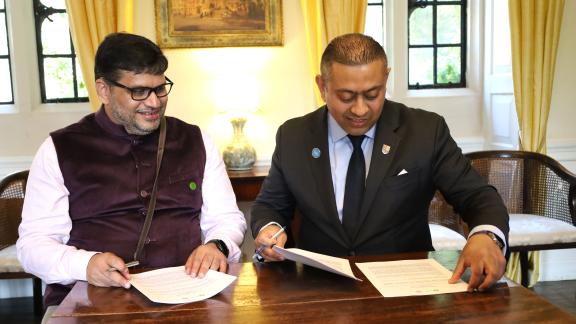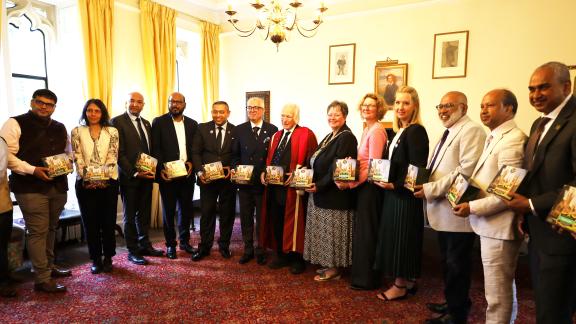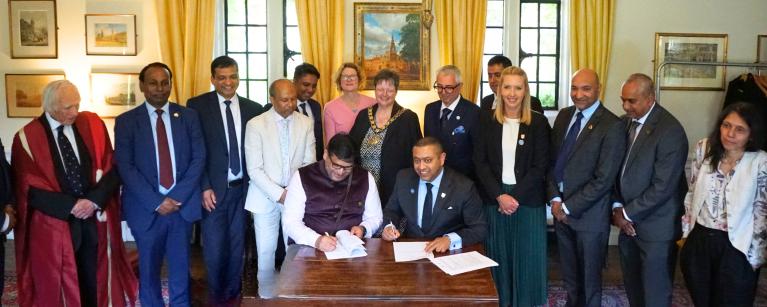20 May 2025, Oxford, UK – In a step towards transforming the tea industry and uplifting the lives of marginalized workers, Oxfam and the Fair Pay Foundation (FPF) have signed a Memorandum of Understanding (MoU) in Oxford, UK. This strategic partnership aims to build a global movement for fairness, ethical business, equality, and justice in labor-intensive industries—starting with tea plantations in Bangladesh.
Signed by Sir Sheikh Aliur Rahman KGOR OBE, Ambassador and Chairman of the Fair Pay Foundation, and Ashish Damle, Country Director of Oxfam in Bangladesh, this MoU sets the foundation for the development of a Model Tea State. The model will showcase fair remuneration, ethical & responsible business, decent working conditions, climate-smart practices, gender justice, and economic resilience. The initiative is also endorsed by Dr Halima Begum, Chief Executive of Oxfam GB, reinforcing the partnership’s global resonance.
The tea industry, with its colonial-era systems and discriminatory practices, remains a source of entrenched poverty for thousands of workers—especially women. This collaboration aims to disrupt that cycle by promoting fair pay, ethical production, and sustainable development across the value chain.
Policy makers, business personalities, academicians, Bangladeshi diaspora members of the UK joined the MoU signing event on 19 May 2025 in the evening (UK time). The signing ceremony was held just after the launch of Oxford Tea Collection.

“The signing of this MoU is more than a ceremonial agreement. It is a commitment to restoring dignity, equality, and opportunity for one of the most exploited labor forces in the world,” said Sir Sheikh Aliur Rahman KGOR OBE, Chairman of the Fair Pay Foundation. “With Oxfam’s legacy of grassroots empowerment and FPF’s vision for radical global fairness, we will co-create a new chapter for tea workers—not just in Bangladesh, but as a model for the world.”
As part of the partnership, Oxfam and FPF will collaborate to implement a comprehensive roadmap to operationalize the Model Tea State in Bangladesh. This includes conducting in-depth social architecture and power analyses, assessing market opportunities, promoting eco-tourism, introducing renewable energy solutions, improving housing and health infrastructure, and amplifying the voice and agency of women workers through leadership platforms.
Dr Halima Begum, Chief Executive of Oxfam GB, emphasised the transformative potential of this collaboration: “Today’s partnership towards Fair Pay as a movement shows that when we say we stand with marginalised communities, we mean it. With our investment in the Model Tea State, we are helping to build a future where workers and owners are partners, with shared ambitions and values.’
The MoU also outlines strategic pathways for advocacy and influencing—both locally and globally. From launching the Global Fair Pay Charter in Bangladesh to creating a five-year media partnership and engaging ministries, private sectors, and global markets, the initiative seeks to spark wide-scale systemic change.
“Fair pay is not a privilege—it’s a right. This partnership gives us the opportunity to challenge structural inequality and offer real alternatives rooted in dignity, sustainability, and justice,” stated Ashish Damle, Country Director of Oxfam in Bangladesh. “Together with the Fair Pay Foundation, we are not just imagining change—we are engineering it.”
With this alliance, Oxfam and the Fair Pay Foundation invite governments, civil society, and the private sector to join in creating a world where fairness and equity are not ideals—but lived realities.

Md Sariful Islam | Head of Influencing, Communications, Advocacy & Media (ICAM) | Oxfam in Bangladesh | sariful.islam@oxfam.org, mdsaislam@oxfam.uk.org
